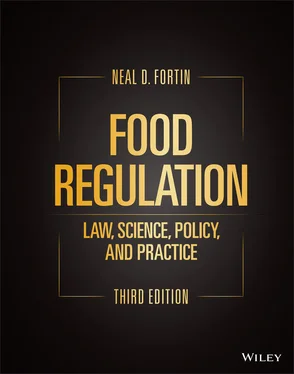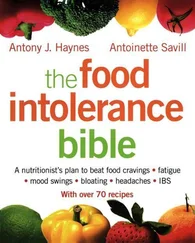Neal D. Fortin - Food Regulation
Здесь есть возможность читать онлайн «Neal D. Fortin - Food Regulation» — ознакомительный отрывок электронной книги совершенно бесплатно, а после прочтения отрывка купить полную версию. В некоторых случаях можно слушать аудио, скачать через торрент в формате fb2 и присутствует краткое содержание. Жанр: unrecognised, на английском языке. Описание произведения, (предисловие) а так же отзывы посетителей доступны на портале библиотеки ЛибКат.
- Название:Food Regulation
- Автор:
- Жанр:
- Год:неизвестен
- ISBN:нет данных
- Рейтинг книги:4 / 5. Голосов: 1
-
Избранное:Добавить в избранное
- Отзывы:
-
Ваша оценка:
- 80
- 1
- 2
- 3
- 4
- 5
Food Regulation: краткое содержание, описание и аннотация
Предлагаем к чтению аннотацию, описание, краткое содержание или предисловие (зависит от того, что написал сам автор книги «Food Regulation»). Если вы не нашли необходимую информацию о книге — напишите в комментариях, мы постараемся отыскать её.
Food Regulation: Law, Science, Policy, and Practice
Food Regulation: Law, Science, Policy, and Practice, Third Edition,
Food Regulation — читать онлайн ознакомительный отрывок
Ниже представлен текст книги, разбитый по страницам. Система сохранения места последней прочитанной страницы, позволяет с удобством читать онлайн бесплатно книгу «Food Regulation», без необходимости каждый раз заново искать на чём Вы остановились. Поставьте закладку, и сможете в любой момент перейти на страницу, на которой закончили чтение.
Интервал:
Закладка:
Due process also requires that when the government takes action affecting a person’s rights or entitlements, the person must be given notice of the intended action and an opportunity to challenge the determination. For example, a government agency cannot revoke a food establishment license without giving the owner notice of the action and, under most circumstances, an opportunity to challenge the action before the license is revoked. In an emergency situation the agency may unilaterally revoke a license, but the agency must then give the owner an opportunity to challenge the revocation in a later hearing.
Just Compensation for the Taking of Private Property
The Fifth Amendment provides that no private property shall be taken for public use without just compensation. Agencies may seize or embargo food for being adulterated or misbranded. Is such a seizure a “taking” under the Fifth Amendment? If it is, then the government would be constitutionally required to compensate those persons whose private property rights were affected.
Adulterated food with no commercial value presents an easy answer because with no value there can be no takings. However, the state is not required to compensate the seller of adulterated meat for the salvage value of the protein.
Seizures clearly interfere with people’s use and enjoyment of their property. However, foods under seizure are not taken for the public use. The purpose of the seizures is protection of the public’s health and welfare. However, in keeping with the broad authority, the Constitution extends to government as the protector of public health and safety, the general rule is that government seizure of private property to prevent harm does not require compensation.
The Supreme Court balances the public interest involved against the reasonableness of the infringement on individual private interests. In Mulger v. Kansas, 123 U.S. 623 (1887), the U.S. Supreme Court noted:
The power which the States have of prohibiting such use by individuals of their property as will be prejudicial to the health, the morals, or the safety of the public, is not—and, consistently with the existence and safety of organized society, cannot be—burdened with the condition that the State must compensate such individual owners for pecuniary losses they may sustain. The exercise of the police power by the destruction of property which is itself a public nuisance, or the prohibition of its use in a particular way, whereby its value becomes depreciated, is very different from taking property for public use, or from depriving a person of his property without due process of law. In the one case, a nuisance only is abated; in the other, unoffending property is taken away from an innocent owner.
Source : Modified from Mugler v. Kansas , 123 U.S. 623 (1887), U.S. Supreme Court.
The courts have routinely upheld the exercise of the police power even when property will be confiscated or destroyed.
Equal Protection
The U.S. Supreme Court has also interpreted due process to mean that no person shall be denied equal protection of the laws. This guarantee is provided for explicitly in the Fourteenth Amendment, applicable to the states, and implicitly in the Fifth Amendment Due Process clause, applicable to the federal government. Equal protection of the law refers to an even‐handed application of law. In its most basic sense this means that government and the legal system cannot arbitrarily discriminate. Equal protection may be violated in two ways: directly by the words of the law or by the application of the law.
Equality before the law applies not only to the specifics of a law but also to how agencies implement the law. For example, under a local ordinance, which prohibited the construction of wooden laundries without a license, almost all Chinese applicants were denied licenses, while non‐Chinese applicants routinely received them. Although the ordinance was a valid safety measure on its face, the implementation violated the equal protection clause of the Fourteenth Amendment. 46
Nonetheless, equal protection does not require identical treatment. Government may classify people into groups and treat these groups differently. For example, regarding workers in food establishments, the law places special restrictions on persons suffering from certain communicable diseases. This distinction does not violate equal protection because the government may differentiate between individuals and groups if it has good reason to do so. The critical question is what is an acceptable reason for applying the law differently to persons in similar situations.
Privacy Rights
Although privacy right objections are frequently made against public health laws—such as immunization, fluoridation, and compulsory HIV testing—the argument is less common against food laws. The seminal case on privacy rights is Griswold v. Connecticut, 381 U.S. 479 (1965), where a Connecticut law prohibited the prescribing of contraceptives and their use by any person, including married couples. The U.S. Supreme Court declared the Connecticut statute unconstitutional. In the main opinion, Justice William O. Douglas laid out the basis of a constitutional right to privacy. The constitutional right to privacy has been applied by the Supreme Court only in situations involving the personal intimacies of the home, the family, marriage, motherhood, procreation, and child rearing. Efforts to expand the right of privacy to less intimate areas as a basis for invalidating public health and safety laws have not succeeded.
1.5 AGENCY JURISDICTION
Federal responsibility for the direct regulation of food in the United States has primarily been delegated to the FDA and the USDA. However, a number of other federal agencies become involved, depending on the type of food and the type of activity to be regulated. Although the involvement with food with some of these agencies is less direct than that of FDA and USDA, their roles are neither unimportant nor necessarily small.
| THUMBNAIL COMPARISON OF AGENCY RESPONSIBILITIES FOR FOOD | |
| Agency | Responsibility |
| Environmental Protection Agency (EPA) | Drinking waterPesticide residues |
| Food and Drug Administration (FDA) | Food (but not meat)Drug (OTC and prescriptions)Dietary supplementsCosmeticsMedical devicesBottled waterSeafoodWild game (“exotic” meat)Eggs in the shell |
| Federal Trade Commission (FTC) | Advertising |
| Alcohol and Tobacco Tax and Trade Bureau (TTB) | Alcohol |
| U.S. Department of Agriculture (USDA) | Raw vegetables gradingRaw fruit gradingMeatsPoultryEggs, processing, and grading |
The remainder of this chapter presents an overview of principal federal regulatory organizations responsible for food regulation 47 along with a summary of the major federal statutes.
1.5.1 Food and Drug Administration 48 (FDA)
Oversees
All domestic and imported food sold in interstate commerce, including shell eggs, but not meat and poultry.
Bottled water.
Beverages with less than 7 percent alcohol, but malt beverages only if less than 0.5 percent alcohol.
Shell eggs and egg containing products that do not meet USDA’s definition of “egg product.” Egg washing, sorting, packing. 49
All fish, except catfish.
Food Safety Role
Food safety laws governing domestic and imported food, except meat and poultry, are enforced in a number of ways by:
Inspecting food production establishments and food warehouses.
Читать дальшеИнтервал:
Закладка:
Похожие книги на «Food Regulation»
Представляем Вашему вниманию похожие книги на «Food Regulation» списком для выбора. Мы отобрали схожую по названию и смыслу литературу в надежде предоставить читателям больше вариантов отыскать новые, интересные, ещё непрочитанные произведения.
Обсуждение, отзывы о книге «Food Regulation» и просто собственные мнения читателей. Оставьте ваши комментарии, напишите, что Вы думаете о произведении, его смысле или главных героях. Укажите что конкретно понравилось, а что нет, и почему Вы так считаете.












